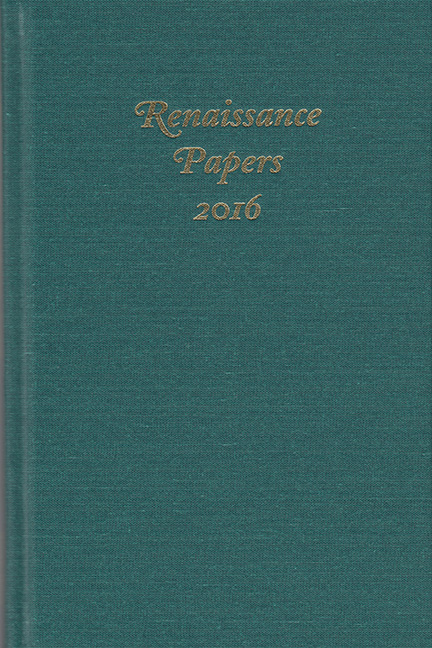Book contents
- Frontmatter
- Contents
- Renaissance Papers
- Beyond Recognition: Mutilation, Marginalia, and the Vicissitudes of Reading
- Velázquez as Reader and the Pictor Doctus in Early Modern Spanish Art
- “Out of this silence yet I picked a welcome”: The Audience in A Midsummer Night's Dream
- Uncommon Justice: The Secret Knowledge and Sagacious Judgment of Old Escalus
- Boundaries in a Globalized World: Shakespeare's Antony and Cleopatra
- Imitation, Innovation, and Imperium: The Grammar School Education of Lear's Daughters
- Violent Brothers, Deadly Antifeminism, and Social Suicide in The Revenger's Tragedy and The Duchess of Malfi
- Canon Fodder: Notes on Don Quijote
Boundaries in a Globalized World: Shakespeare's Antony and Cleopatra
Published online by Cambridge University Press: 23 August 2019
- Frontmatter
- Contents
- Renaissance Papers
- Beyond Recognition: Mutilation, Marginalia, and the Vicissitudes of Reading
- Velázquez as Reader and the Pictor Doctus in Early Modern Spanish Art
- “Out of this silence yet I picked a welcome”: The Audience in A Midsummer Night's Dream
- Uncommon Justice: The Secret Knowledge and Sagacious Judgment of Old Escalus
- Boundaries in a Globalized World: Shakespeare's Antony and Cleopatra
- Imitation, Innovation, and Imperium: The Grammar School Education of Lear's Daughters
- Violent Brothers, Deadly Antifeminism, and Social Suicide in The Revenger's Tragedy and The Duchess of Malfi
- Canon Fodder: Notes on Don Quijote
Summary
IN Antony and Cleopatra, Shakespeare represents the effects of global interconnectedness and mobility, but he also raises the issue of how to sustain a sense of the local and maintain our own “little world” when global forces of empire expand their reach. Lucy R. Lippard defines the “lure of the local” as “the pull of place,” “the need to belong somewhere.” In this essay, I want to explore the extent to which the global meets the local in Shakespeare's Antony and Cleopatra, a “nexus” between the restlessness and mobility of an expanding colonial empire and a desire for permanence and rootedness. In a more specific context, Shakespeare associates the lure of the local with Egypt and grounds it in Egyptian cultural traditions and practice, which resist Rome's global influence and military hegemony. When Cleopatra insists on commanding her own troops, side by side with Antony, into battle, she argues that she bears “a charge” in the war, and that, “as the president of [her] kingdom,” she will appear on the battlefield “for a man” (3.7.19–23). The play raises a fundamental question about what it means to “preside” over and be a “guardian” of such a world.
Immanuel Wallerstein, in his seminal work on global systems theory, argues that “globalism” refers to a period of transition and of processes that initiated around 1450 and extend to the present day. Jyostna Singh describes the early modern period as an age of transition and of paradigm shifts, and situates England's “emerging role in the complex of travel and traffic in diverse regions and nations.” As Barbara Sebek argues, the forces of globalism in the period from 1550 to 1700 met with “cultural ambivalence, if not outright condemnation, prompted by the period's unprecedented commercial expansion.” Like Wallerstein, Sebek argues that “the early processes of globalization must be viewed as intertwined economic and cultural phenomena.” In Antony and Cleopatra, however, Shakespeare does not seem interested in economic phenomena of Rome's expansion into Egypt, although he may be reflecting the anxieties associated with global trade. Rather, in this play, Shakespeare focuses on sites of cross-cultural and transnational encounters through which he localizes and explores a global/local nexus. Throughout the play, Rome, which is intensely preoccupied with global politics, asserts its emerging military power over the entire Mediterranean basin and beyond.
- Type
- Chapter
- Information
- Renaissance Papers 2016 , pp. 69 - 78Publisher: Boydell & BrewerPrint publication year: 2017
- 1
- Cited by

